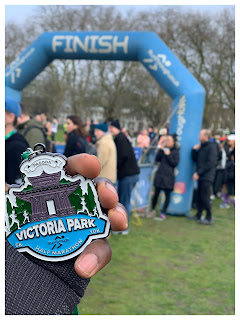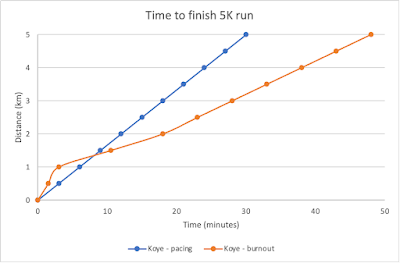 |
When I first started running the 5K, I did not understand pacing. After the warmup, I would start running as quickly as possible – I used to run the 100m in secondary school after all. This inevitably meant I would be out of breath after a few short minutes. I would be so exhausted that I would have to slow down to a walk or stop to catch my breath.
As time passed, I learnt the importance of pacing myself. I learnt that running slower allowed me to keep going for longer, which meant I could finish the race without stopping and still have energy left at the end. It seems obvious in retrospect, but it was a powerful lesson that helped me become a better runner.
Because I like graphs, here’s one to help you visualize what I described above. In the first case with the orange line, I’ve come out running really fast and it takes only three minutes to finish KM 1. I then run out of breath, so I slow down to a slow walk and take 15 minutes to finish KM 2, and then 10 minutes each for the remaining three kilometres. That’s a total of 48 minutes. In the second case, with the blue line, I pace myself and instead run each kilometre in six minutes. I never run out of breath, so I never need to slow down or stop.
When I think about my work last year, I realize that I danced around burnout a lot. I would go hard at things for several days in a row, and then my brain would just shut down. Sometimes I was so burnt out that I struggled to do simple mental sums. My brain would force me to slow down to a crawl for a day or two, then I’d go at it again once I had caught my breath.
Clearly, that is not sustainable. Many articles and reports discussing the great resignation of 2021 pointed to burnout as one reason why knowledge workers were quitting their jobs in droves.
Therefore, one thing I’m doing differently this year is pacing myself better. That means taking things easier, planning better in advance to reduce last-minute sprints, and working in a more sustainable way – including taking breaks to walk and exercise when I need them.
*****
Closely linked to pacing myself, I’m also going to single-task more this year. Multitasking is a scam. It stresses me out and reduces my productivity significantly. At several points last year where I felt that I had too much to do and turned to multitasking as a temporary solution, I ended up more anxious and less productive.
For example, I would sometimes try to write important communications – such as a document or an email – while listening in on calls where I wasn’t actively contributing. I can’t remember a single important email that I made meaningful progress on this way. Instead, I missed out on any opportunities to contribute on the call I was sitting in and felt more frustrated and acutely aware of the progress I wasn’t making.
Clifford Nass, the late Stanford Communications professor, summarises some of the thinking on this in an NPR interview.
We have scales that allow us to divide up people into people who multitask all the time and people who rarely do, and the differences are remarkable. People who multitask all the time can’t filter out irrelevancy. They can’t manage a working memory. They’re chronically distracted. They initiate much larger parts of their brain that are irrelevant to the task at hand … they’re pretty much mental wrecks.
This year, I’m working to spend most of my time single-tasking on the important stuff where I can make a real difference.
*****
Tell me, what are you doing differently in your work-life this year?
*****
What I’m currently reading: I have a young associate who has bounced from job to job for a few years now. In our conversations, he often benchmarks himself to leaders in his field and aspires to the types of positions they hold. Because he interviews well, he often gets into relatively senior-level jobs but then has to leave these jobs after a few months because he cannot perform at the required level. The problem here is two-fold, he lacks career capital and is unwilling to do the work to acquire it.
In So Good They Can’t Ignore You, Cal Newport argues that the traits that make a great job great are rare and valuable, and therefore, if you want a great job, you need to build up rare and valuable skills—which he calls career capital—to offer in return. As you move up, you cash in this capital for rewarding jobs that offer you more autonomy.
What kind of career capital are you acquiring?
As I mentioned last week, I’m re-reading this book to start the year and I’ve rediscovered so many rare gems. I especially recommend it as a career framework for generalists who feel that they could fit into many different industries and don’t have any stand-out passions.
What I’m currently listening to: In October, I wrote about reading Oliver Burkeman’s Four Thousand Weeks. I wrote: “After a run of books aimed at helping you get more out of your time, Four Thousand Weeks is a welcome time-‘unmanagement’ book.” I was very delighted yesterday to find that he had been on The Guardian’s Today In Focus podcast to talk about the book.
In this 27-minute episode, he provides a brilliant and accessible summary of the most important thoughts in the book. In fact, I now recommend the podcast episode over the book.
*****
Thank you for reading! If you liked this, please share it with at least one person using this button.
Have a nice week ❤️.

No comments:
Post a Comment